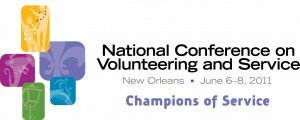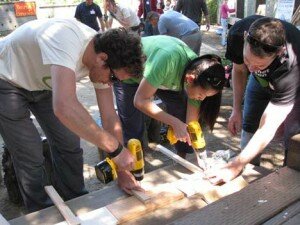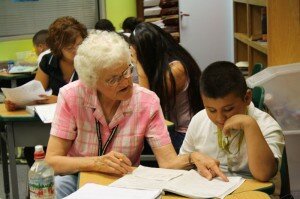Today’s post features an info-graphic that visually displays the amazing impact your service today will make in communities around the nation! To learn more check out our blog post: “Serve for a Cause.”

Today’s post features an info-graphic that visually displays the amazing impact your service today will make in communities around the nation! To learn more check out our blog post: “Serve for a Cause.”

 This year’s National Conference on Volunteering and Service is being held in New Orleans; a city that understands the effect that volunteers can have on a city. After hurricane Katrina and the Gulf oil spill, thousands of volunteers from all across the country came to New Orleans and the Gulf Coast to help rebuild and recover. These volunteers have given of their money and time to help rebuild, but there’s still a lot of work done to bring the Gulf Coast back to the way it was before the recent disasters.
This year’s National Conference on Volunteering and Service is being held in New Orleans; a city that understands the effect that volunteers can have on a city. After hurricane Katrina and the Gulf oil spill, thousands of volunteers from all across the country came to New Orleans and the Gulf Coast to help rebuild and recover. These volunteers have given of their money and time to help rebuild, but there’s still a lot of work done to bring the Gulf Coast back to the way it was before the recent disasters.
While, overall, the conference helps people who work with volunteers in the nonprofit and for profit sector, there are three program tracts that will help attendees to tailor their experience to be the most useful for them. The tracts look at the impact that volunteers can have on their community, the strength that volunteers bring to bear when they serve, and how volunteers help to build and support communities.
 Looking at the impact of volunteers highlights the individual, institutional, and community change that volunteers can bring about through their service. Sessions in the impact track focus on specific solutions that volunteers can bring to economic, environmental, and health problems, disaster management, and veterans’ and education issues that our communities face.
Looking at the impact of volunteers highlights the individual, institutional, and community change that volunteers can bring about through their service. Sessions in the impact track focus on specific solutions that volunteers can bring to economic, environmental, and health problems, disaster management, and veterans’ and education issues that our communities face.
The strength of volunteers is highlighted in sessions that help volunteer managers to more efficiently direct that strength. These sessions will help to harness the innovative ideas, partnerships, and passion that volunteers bring to the organizations that they serve with. Proven methods and emerging trends in volunteer management will be shared in sessions that can help volunteer programs to adapt to the ever changing social and socio-economic realities of society and the volunteering sector.
These sessions will help you to learn how to more effectively manage volunteers and manage for results, how to bring the power of technology and media to bear to support your programs, how to leverage partnerships for results, and how to work with businesses to build successful employee volunteer programs.
Sessions that focus on community not only look at the places where live, but the groups that people belong to and build themselves. These communities can be harnessed to create massive change, and are already primed for volunteering, leadership, and service.
 Boomers and youth have a lot to contribute to their communities. There are Cities of Service across the country that are using volunteers to address some of those cities’ most pressing issues. Faith-based and neighborhood organizations are stepping up to fill in where services are lacking in communities. Service is being reimagined across the country, especially service in rural areas.
Boomers and youth have a lot to contribute to their communities. There are Cities of Service across the country that are using volunteers to address some of those cities’ most pressing issues. Faith-based and neighborhood organizations are stepping up to fill in where services are lacking in communities. Service is being reimagined across the country, especially service in rural areas.
This year’s Conference is taking shape to be the largest Conference to date. There will be knowledge shared and connections made here that couldn’t happen anywhere else. And, among all of the learning and networking, we’ll be sure to take some time to celebrate everyone that is working so hard to improve their world through service.
To find out how to register for the National Conference on Volunteering and Service, click here. To find out more about what will be happening at the Conference, follow and like the Conference .
You can find out more about the National Conference on Volunteering and Service on the Points of Light Blog, which looks at what the Conference offers the volunteering sector, and a video from New Orleans mayor Mitch Landrieu.
This post originally appeared on Service is Power, Megan Hill’s website dedicated to her business as a nonprofit grant writer and her life as an AmeriCorps alumna. It appeared on May 11, 2010.
Ever since my gig with AmeriCorps NCCC, I’ve pondered: Can one person make a significant difference? Because if not, I knew there was very little point to my often menial work in the corps–the tiny shards of hurricane debris we removed from the south Louisiana swamp come to mind. At a certain point, I was so frustrated with the apparent lack of real change happening, with the lack of visible momentum as a result of those long hours I toiled, that I wanted to quit.
It’s a topic I’ve revisited many times, and one I’m largely at peace with for myself. But I wanted to bring it up here and get some feedback from you, readers.
It came up again for me recently, during a viewing of the documentary No Impact Man. It’s the story of one man’s attempt to, well, change the world. Colin Beavan lives in a New York City apartment with his wife and young daughter, and together they embark on a year-long project: live with zero environmental impact. They turn off the lights, unplug everything, eat locally, stop flying, etc. I’m probably not doing it justice here, but just imagine heating your bath water on the stove and using homemade shampoo and eating by candlelight and buying only what you can get at the farmer’s market without using any plastic wrapping. Things got pretty rough for those folks.
At one point, Colin starts to question himself and the legitimacy of his project. What is it that I am doing here, really? What does it all mean? Am I making a difference? It’s the same crisis of conscience I had in NCCC. Colin is well-spoken on the topic in the movie:
The fact of the matter is that if only I change, it’s not going to make a difference, but the hope is that if each of us as individuals change, it’s going to inspire everybody to change. So I believe the most radical political act there is, is to be an optimist. The most radical political act there is, is to believe that if I change, other people will follow suit.
I have no doubt that Colin’s project, at the very least, got a lot of people thinking about the impact of their habits and activities. But what about those of us who don’t make a movie that is then viewed by thousands (millions?) of people? What about those of us whose good deeds really do go unrecognized? Is there value in that kind of work?
It can be hard to see it at the time, but I think there is. If you make a small difference in one person’s life, you’ve helped heal one of the world’s many wounds. What more can we reasonably expect of ourselves, than to begin every day with the knowledge that even our smallest actions have power?
I disagree with Colin slightly: if I am the best person I can possibly be, I’ve already made the world a better place, even if I haven’t inspired others. Although I think that other people will naturally follow suit, because good deeds are naturally infectious.
 Megan Hill is a New Orleans native and a frequent volunteer. She is a certified nonprofit grant writer and a freelance journalist covering travel, sustainable food, and the environment. Megan is a two-term AmeriCorps alumna and she is writing a memoir about her time in AmeriCorps NCCC.
Megan Hill is a New Orleans native and a frequent volunteer. She is a certified nonprofit grant writer and a freelance journalist covering travel, sustainable food, and the environment. Megan is a two-term AmeriCorps alumna and she is writing a memoir about her time in AmeriCorps NCCC.
“I haven’t said this out loud before, but the enormity of his need actually frightens me,” she confessed.
While we waited for the curtain to come up, my girlfriend Elaina told me about a ten year old boy named Ty who is a friend to her son Graham.
“Ty lives in our city’s housing projects with his mother who is raising him on her own. She suffers from severe diabetes and is frequently hospitalized for extended periods of time with life threatening illnesses.”
“Graham and Ty have been close friends since kindergarten,” Elaina told me. “When Graham recently sprained his ankle playing basketball, Ty was the only one of his teammates who rushed over to see if Graham was all right. It was Ty and the coach that helped Graham limp off the court.”
She paused, but soon continued.
“I went to pick Ty up for a play date this morning and, in front of him, his mother told me she was worried because he was becoming such a fat pig. She actually used the words fat pig! And then she handed him a pop tart for breakfast.”
Elaina shook her head sadly.
“He’s a fabulous kid, really he is, but his needs are so enormous.”
“Every day when I pick Graham up from the after-school program, Ty asks to come home with us.”
“This is irrational,” she said, “but I worry that all the negative things that Ty’s been exposed to and forced to live with will somehow rub off on Graham.”
“None of Ty’s circumstances are his fault,” I offered. “He probably doesn’t like them any more than you do.”
“I know,” she sighed.
We were quiet for a moment.
“What do you think would it cost you and your family to become wide open to Ty, to commit to him? What is the worst thing that could happen?”
“I don’t know,” she said. “I guess I’m afraid that his enormous need would completely consume our family life.”
There was another pause in the conversation.
“What would you like Graham to learn from the choices you make about Ty?” I asked.
The lights dimmed over the audience and the show we were waiting to see began.
We didn’t return to our conversation about Ty, but he stayed on my mind.
Elaina’s struggle seemed immensely important to me, but I couldn’t put my finger on why I felt so triggered by it.
Then, in the car this morning my husband and I discussed something I’ve been grappling with at work.
For most of my career I have advocated for people to be active, engaged citizens.
Last week, I initiated an online conversation by asking “If you could direct the full force of the American volunteer spirit to effect change on a single social issue, what would you ask people to do?”
One respondent said that while he believed that volunteers alleviated suffering, he didn’t believe they were capable of making systemic change.
I told my husband that even after twenty years of this work, I found myself worrying about what he said, worrying about the possibility of him being right.
My husband smiled at me.
“I think individual action might be all there is,” he said.
“What do you mean?” I asked.
“There are so many huge, international NGO’s set up to end poverty,” he said, “but what really works?”
There was a pause.
“In the end, it boils down to individual, human relationships,” he said.
I nodded, finally understanding why my friend’s story seemed so urgent.
It’s possible that breaking the cycle of poverty boils down to the choice Elaina makes about Ty and the choices the rest of us make about the Tys we find in our lives.
[]
 follow:
follow: